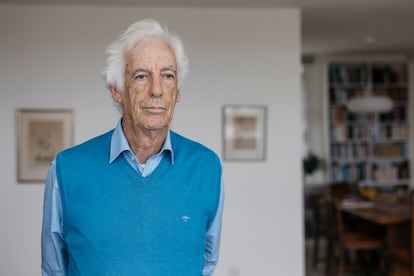Moshe Zimmermann, Israeli historian: ‘Jewish nationalism tends to consider everything that does not belong to its nation as the enemy’
The former director of the center for German history at the Hebrew University of Jerusalem believes that the ‘pogrom’ of October 7 forces us to ‘question the whole idea of Zionism’

Moshe Zimmermann’s family history coincides with his academic specialization. He was born 80 years ago in Jerusalem because his parents fled Nazism in 1938, moving from Hamburg to the British protectorate of Palestine. In the last 50 years he has written dozens of books and articles on German social history, the history of Jews in Germany, nationalism and antisemitism. A professor emeritus of modern history at the Hebrew University of Jerusalem, he directed the Richard Koebner Minerva Center for German History and received the Humboldt Prize for international researchers.
Along the way, he has also delved into cinema and sports, as attested to by the large library inside his home in Kiryat Ono, 6.8 miles east of Tel Aviv. He has not remained within the confines of his academic ivory tower, instead coming down to provide a counter-current analysis of his country’s present, to the point of drawing parallels with Nazism. This struck a chord and earned him three defamation suits that were all ultimately dismissed. He believes that the “pogrom” perpetrated by Hamas on October 7 forces us to “question the whole idea of Zionism,” and that comparing it to the Holocaust is a tremendous example of weakness.
Question. On the way here, I heard Israeli Prime Minister Benjamin Netanyahu on the radio saying that Israel is fighting neo-Nazis. Why is what has happened since October 7 being framed as related to the Holocaust?
Answer. The absolute and historical enemy of the Jews were the Nazis, so if you want to delegitimize your enemy, it is best to compare him with them. It has become an instinct in Israel, mainly among politicians. It has an element of truth. In one day, more than a thousand Jews were massacred. A pogrom. So one instinctively clings to that comparison. But it is also the source of great weakness. If the worst catastrophe in Jewish history since 1945 has occurred in Israel, we must admit that something is wrong with the whole idea of Zionism, which was created to save the Jews from a diaspora that lasted 2,000 years. And the question is: what did Zionism do on October 7 to save the Jews?
Q. But it was a day, not the six million exterminated in the Holocaust — that could not happen today in Israel. So how does that challenge the whole idea of Zionism?
A. I don’t want to say that it is the end of the idea of Zionism, but it failed at a crucial moment. If such a defect exists, you have to question the whole idea of Zionism. If as a Jew you are discriminated against, you look for a way not to be. This is what happened in Europe since the end of the 18th century. We believed that self-emancipation, having our own state as a nation, not as a religion, was a solution. Until it emerged that Jewish life is in danger, even within a Jewish state that can defend itself. It created a new problem in the Middle East. You have to wonder if it was taken into account beforehand or not.
Q. And was it?
A. If so, was it the right way to move forward, at the expense of the Palestinians? At first, the idea was typically European. Europe as the center of the world and whose inhabitants can colonize or emigrate anywhere. This is how the United States or South Africa were created. This is how colonialism worked in the 19th century, and the Jews were no strangers to that. The idea was not to create an empire, but to save Jews from persecution. From that approach, a conflict emerged. Jewish nationalism developed the tendency to consider everything that does not belong to its nation as the other; even more, like the enemy. The Arab population of Palestine also learned from the Europeans to develop a national consciousness. Soon we had two national identities living in the same place and in conflict.

Q. Those who went to Palestine saved their lives...
A. The majority believed that Europe would provide them with security. It is the main argument in favor of Zionism after 1945. This poses a problem. If [Nazi Marshal] Rommel had occupied Palestine, he would have treated the Jewish population like that of Europe. The counterargument is that if they had already had a state, things would have been different. Take the fate of Poland or Czechoslovakia under Nazi occupation... A state is no guarantee. The fact that people like my family, who went to Palestine, were saved was in large part due to luck.
Q. This touches on what is happening today: having a state and an army does not guarantee safety against all threats.
A. It is an illusion created by the state of mind that everything that happened to us was because we did not have sovereignty. And it is a paradox with no way out. Jews who experience antisemitism abroad are willing to move to Israel, but it is not a safe haven. In the end, Israel is today the main target of antisemitism, and Jews outside Israel have not been spared from antisemitism. Was it predestined, or was it a mistake?
Q. What do you think?
A. If from the beginning the tendency had been to create a nation-state in Palestine based on cooperation with the Arabs on equal terms, the basis for a Jewish existence without antisemitism could have been laid: there would be no motivation for non-Jews to adhere to antisemitic ideas. What we are experiencing today is increasing antisemitism due to the existence of Israel.
“My opinion is that taking revenge on Hamas at the expense of Gazans is unjustified and irrational, but not genocide”
Q. The counterargument is that antisemitism simply takes different forms.
A. Antisemitism is based on stereotypes. But it needs a platform to articulate itself. What would have happened to antisemitism if Israel did not exist? I’m not saying Israel is the cause of this, but it gives antisemites the opportunity to turn latent antisemitism into overt antisemitism. And since Israel behaves the way it does, it favors it.
Q. Where is the line between a legitimate criticism of Israel and an antisemitic one?
A. Motivation. If you attribute a Jew’s behavior to being Jewish, you are arguing on the basis of antisemitism. If you criticize Israel for ruling the West Bank and you would say the same thing about any other nation that occupies territory and subjugates its inhabitants, it is not antisemitism. Or even if you call for a boycott. It is not antisemitic per se. Israeli politicians automatically define all criticism as antisemitic, which will have a boomerang effect, because then it can be said that any criticism of Israel is not antisemitism by definition, even if stereotypes are used.
Q. The International Holocaust Remembrance Alliance’s definition of antisemitism includes comparing the policies of Israel and the Nazis, as you have done...
A. Comparing is something we historians do to understand. I did so with the idea of warning Israeli society that there are elements of Israeli politics or behavior comparable to elements of National Socialism.
Q. So where are we now regarding these elements and what is happening in Gaza?
A. Everyone is using the word genocide. The comparison is legitimate, but I hope that [the International Court of Justice in] The Hague will pay attention to the differences. The genocide planned by the Nazis was based on a plan to wipe out an entire group of people. You cannot prove that this is happening in Israel. My opinion is that taking revenge on Hamas at the expense of Gazans is unjustified and irrational, but not genocide.
Q. You are just now investigating the moment when nations “went crazy,” as happened during Nazism. How does that happen?
A. Only in retrospect do you discover how deep the chasm crossed was. For many, January 31, 1933 [the day after Hitler was appointed chancellor] was no different from January 29. “We have a new government every six months, now Hitler…” Six months later, they discovered that what they got was not just another chancellor.
Sign up for our weekly newsletter to get more English-language news coverage from EL PAÍS USA Edition
Tu suscripción se está usando en otro dispositivo
¿Quieres añadir otro usuario a tu suscripción?
Si continúas leyendo en este dispositivo, no se podrá leer en el otro.
FlechaTu suscripción se está usando en otro dispositivo y solo puedes acceder a EL PAÍS desde un dispositivo a la vez.
Si quieres compartir tu cuenta, cambia tu suscripción a la modalidad Premium, así podrás añadir otro usuario. Cada uno accederá con su propia cuenta de email, lo que os permitirá personalizar vuestra experiencia en EL PAÍS.
¿Tienes una suscripción de empresa? Accede aquí para contratar más cuentas.
En el caso de no saber quién está usando tu cuenta, te recomendamos cambiar tu contraseña aquí.
Si decides continuar compartiendo tu cuenta, este mensaje se mostrará en tu dispositivo y en el de la otra persona que está usando tu cuenta de forma indefinida, afectando a tu experiencia de lectura. Puedes consultar aquí los términos y condiciones de la suscripción digital.









































